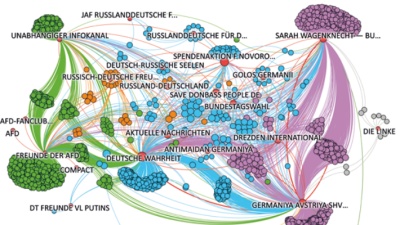Post-Soviet Migrants and Transnational Public Spheres on Social Media
Post-Soviet Migrants and Transnational Public Spheres on Social Media

Project description
The project looks at media usage among Russian-speaking migrants through an analysis of communication on the Russian social networking site VK.com, which is viewed in the context of Russia’s soft power in Europe. Sociologist Tatiana Golova is studying how open groups and public pages associated with Russian-speaking migrants in Germany interact with other collective resources in Germany, Russia and the rest of the post-Soviet space. Particularly in light of the 2017 Bundestag elections and the attempted mobilisation of ethnic Germans from Russia (Russlanddeutsche) by the populist far right, the project’s guiding question on how politicised communication networks between Germany and Russia evolve and are fostered by post-Soviet migrants living in Germany has become especially relevant.
To answer this question, networks of open groups and the public pages of post-Soviet migrants and other actors with a connection to Germany are reconstructed on the basis of reposts, i.e. the recognisable borrowing of content from other accounts. This has allowed Golova to map information flows between ‘East’ and ‘West’ as well as the links between politicised post-Soviet migrant groups and the German far right that give rise to transnational illiberal publics. The positions of political subnetworks are generally consistent with official Russian discourses, for example, in relation to the conservative and illiberal critique of the ‘West’, Euroscepticism, and the separatist mobilisations and pseudostates supported by the Russian state in eastern Ukraine.
Golova argues that where social networks are concerned, the soft power of authoritarian states is not solely or primarily a matter of state-directed infiltration of another national cyberspace. The transnational expansion of Russian social networks is due rather to the actions of various actors, including members of the post-Soviet diaspora, which result in the creation of complex communication spaces. By enabling the spread of hegemonic discourses and popular narratives beyond the territory of the Russian Federation via a digital medium regulated by the Russian state, these spaces also serve as resources for Russian soft power. Rather than examining Russian influence on the basis of targeted disinformation campaigns or political doctrines, such as the ‘Russian world’ concept aimed at popularising Russian culture abroad and influencing diasporas, the project focuses on the reconstruction of the transnational flow of information. An analysis of the horizontal construction of communication spaces, and thus of soft power resources, takes centre stage. As the project shows, the flow of information can extend in multiple directions as ‘native’ and ‘transnational’ publics intermingle in different arenas.
Key questions
- How is the transnational flow of information between the post-Soviet space and Germany on social networking sites organised and what social media publics evolve in the process?
- What types of groups, subnetworks and issues can be identified on VK.com in connection with post-Soviet migrants and the transnational Russian-German nexus?
- How transnational are these communication forums in terms of their repost sources and the membership structures of different groups?
- Where can politicised subnetworks be located in relation to official Russian discourses and different German political actors?
